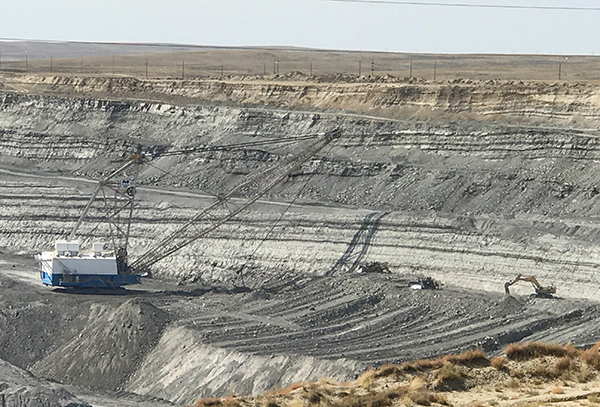
|
Cloud Peak Energy mines coal from its Antelope mine in the Powder River Basin. |
Activists aiming to drive a wedge between insurers and coal companies said the movement picked up steam in the U.S. with the recent announcement that Chubb Ltd. would be cutting its exposure to coal mining and coal-fired power.
A concerted campaign to move European insurers toward pledges to stay away from coal and other fossil fuel projects began focusing significant pressure on companies doing business in the U.S. with a push in 2018. Chubb's announcement is expected to pressure other large insurers to come up with their own policies, activists working on the campaign told S&P Global Market Intelligence.
Moody's Investors Service agreed in a July 1 note, concluding that despite thermal coal being a relatively large sector, insurers' exclusionary policies targeting it are not expected to result in a "meaningful loss of business." Instead, insurance companies could benefit from the reduced exposure to environmental liability risks associated with the industry, the note said. Proactive steps to move away from the coal sector, Moody's said, is viewed positively as companies not only escape potential environmental liabilities, but also the risk those assets are stranded.
"We expect more insurers to follow suit as [environmental, social and governance] risks become more immediate, and regulatory and public focus on them intensifies," the note states. "While ESG factors have only had material credit implications in a limited number of cases, we are increasingly focused on the strategies insurers are adopting to manage the effects of climate change and demographic shifts, which we expect to become more material over time."
The movement away from coal is not only the result of shifts in public opinion, developing views on risk and comprehensive analysis of ESG risk factors going into an investment, but also a response to pressure from lobby groups such as the Unfriend Coal campaign, a global network of nongovernmental organizations including 350.org, Greenpeace Switzerland, Rainforest Action Network, Sierra Club and the Waterkeeper Alliance. The movement to push insurers away from coal started a few years later in the U.S. compared to Europe, but is only going to be putting more pressure on companies going forward, according to Elana Sulakshana, energy finance campaigner at Rainforest Action Network.
"We're just getting started. It's been less than one year since the Insure Our Future campaign launched in the U.S. and we've already had this historic breakthrough," she said of the Chubb decision. "The pressure is just getting started and we expect to see a domino effect like we've seen in Europe."
The pressure on insurers will come from a number of different directions, explained Ross Hammond, senior strategist for the Insure our Future campaign. That includes broad actions such as direct campaigning and talking to cities, corporate and municipal insurance companies, but it also includes creative approaches such as showing up at recruiting fairs where younger workers likely to sympathize with the campaign's climate concerns can be reached before they commit to a company in an industry that is seeking more young workers.
"We're really just trying to figure out as many different levers as we can to get these guys to start doing the right thing when it comes to pulling their support for coal," Hammond said. "Without insurance, you can't build these [coal] projects ... and in insurance, unlike finance, there's just a much smaller universe of insurers."
Peabody Energy Corp., the largest private-sector coal miner in the world, warned its financial assurance obligations may increase due to a number of factors, particularly "in light of some insurance companies' announced unwillingness to support fossil fuel companies" in a February securities filing.
Chubb will no longer underwrite the construction and operation of new coal-fired power plants, nor write new risks for companies generating more than 30% of their revenues from coal mining or energy production from coal. Coverage for existing coal-plant risks that exceed its new threshold will be phased out by 2022 and for utilities beginning in 2022. Exceptions to the policy will be considered through 2022, taking into account the availability of alternative energy sources in certain regions.
While Chubb's announcement is a "game-changer" for the movement, Sulakshana said, it is not perfect. There are a number of "loopholes" allowing for certain coal investments that Sulakshana said should be tightened even further.



